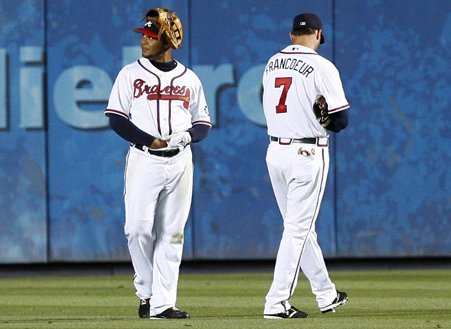So i've been thinking about the conventional wisdom that a corporate owner is less likely to increase payroll and allow the team to make a big splash in the free agent market (% investment in a single player). Now, some of you are just going to stop listening now as you've hear this all before, but I promise this is NOT the logic you've heard before.
First, let's examine the team value (Data from Forbes) Vs. Payrol (Data from USAToday). Note: Forbes' numbers only reach up to the 2004 season so please take this with a grain of salt. When we compare the Year/Year change in value to the same measure of payroll we find the following statistics.
1999: 3.73
2000: 4.04
2001: 2.06
2002: 11.08
2003: -.07
2004: 2.55
As you can see, payroll is directly related to team value with a multiplication factor of between 2 and 4. The blip in 2002 and 2003 indicates an over valuation (actually a bubble if you look at all teams) and then the correction (taken together the two years produce a multiplier of 1.12). So, now that we can SEE that investing in a team actually returns 2-4X the investment, what else would a team need to see that increasing payroll helps?
Well, making big FA signings also draws people to the park. Let's look at Texas' signing of A-Rod. Before the signing, The ballpark at Arlington drew 2,800,147 fans (Data from Ballparks of America). After the singing it drew 2,831,021, a change of 30,874 fans or ~1.1%. Not impressive. But when you include the fact that major league baseball LOST 135,000 fans between 2000 and 2001, a bump up like that is impressive. Further, the only comparable draw ballpark (Houston) lost 150,000 by itself between the two years. That's a 5% drop, making the net gain for Texas over 6%. That ain't bad for a single player*.
Finally, there's the TV and merchandising revenue. Every jersey, hat, bat, or anything else with a team logo is money in the team's pocket. When A-Rod was traded to the Yanks no store in town has an A-Rod jersey in stock 2 days later. TV also got a boost with the YES network reporting record ratings that year. Add to that increased AD revenue and you'll need a dump truck to carry your new loot.
So why don't teams under corporate management make big splashes? Well, unfortunately it's politics. Corporations budget money well in advance and are forced to channel dollars into capital expenditures, not human resources. As much as we think of a great player as a building block, he's just another employee to the company. It's always a tough sell to get the CEO $5mil a year, it's even harder to get someone 5 levels down $20mil.
Such is business. But will Liberty break with tradition and allow JS to pony up for a star? Well, we already know that the payroll is all but fixed at around $80mil but there were early indications that that could be flexible if there was a good opportunity out there. My feeling about that is that if JS can pull off another Hudson trade and needs some cash to get him signedin the short run Liberty is on board. Look at the McCann signing. There was no way the braves had to make that deal, but it was certainly worth the money even if it cost us short term.
But who would Liberty be willing to pony up for? Well i can be all but certain that Liberty would have approved Hudson's deal, and if Buherle had come over, they would have likely approved the deal he signed with the Sox. I know they would not approve an A-Rod type deal, or a Zito deal. That leaves us with some promising ideas. Any young starter with a proven track record would likely get a decent deal with a Liberty seal. That means Snell, Willis, or even Zambrano (though i doubt he's leaving the Cubs) would get a nice deal.
Long story short:
1) the Braves will not be signing a big FA any time soon
2) the Braves do have some money to lock up young talent long term (Frenchy?)
3) a trade that brings in young talent, especially a starter, will likely result in rentention
*I know other things happened, but i'm making a point.
Subscribe to:
Post Comments (Atom)

No comments:
Post a Comment